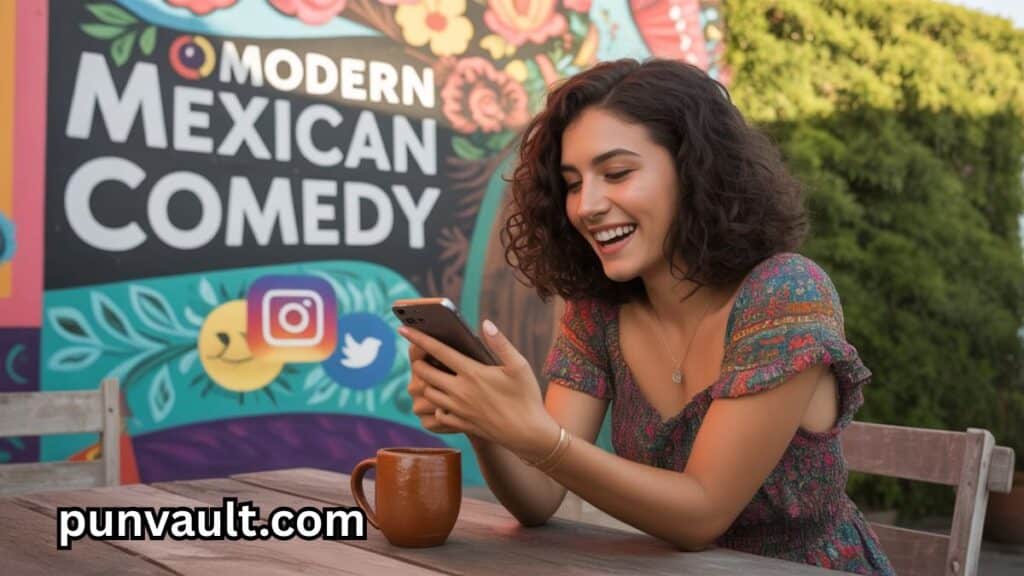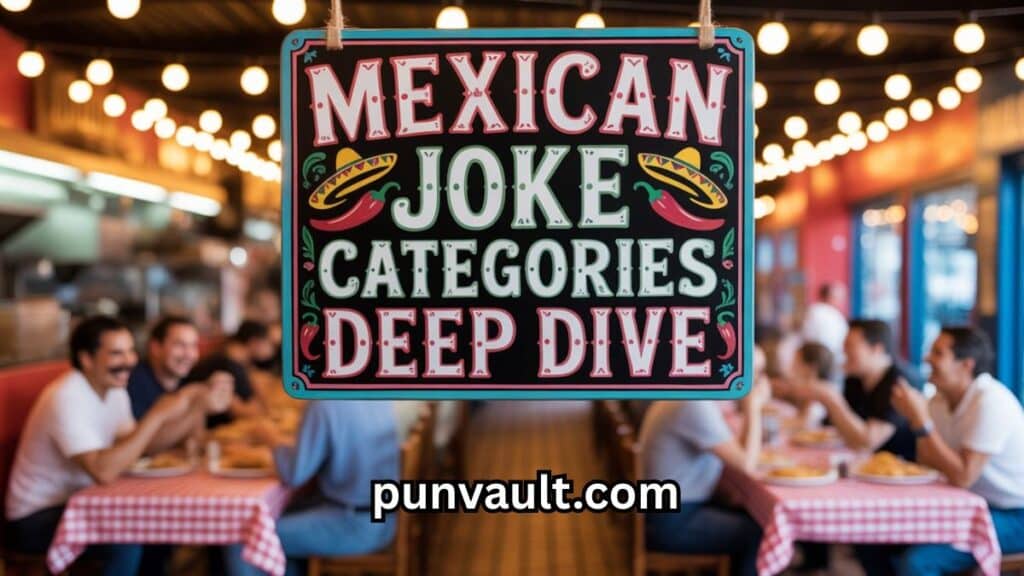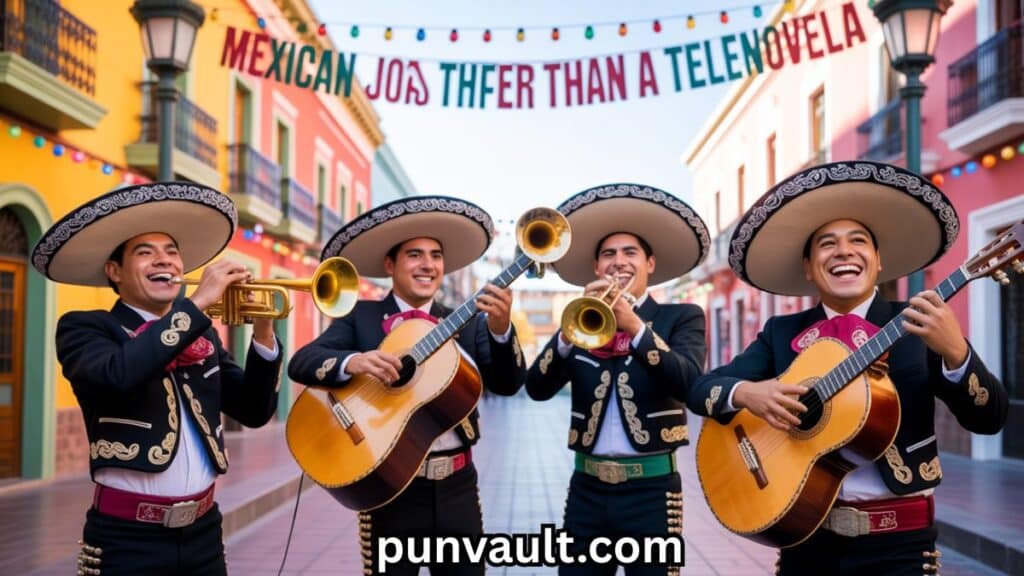Mexican Jokes That Are Funnier Than a Telenovela are a lively blend of cultural charm, witty wordplay, and everyday humor that capture the spirit of Mexico. Rooted in traditions, family moments, and the colorful aspects of daily life, these jokes go beyond simple punchlines. They carry the warmth of gatherings, the spice of Mexican food, and the rhythm of fiestas, making them relatable and entertaining across generations. Much like a telenovela keeps viewers hooked with drama and twists, Mexican jokes captivate with clever wit and lighthearted exaggeration.
Laughter becomes irresistible when the jokes roll in with tacos, mariachis, tamales, and even playful nods to abuelas and the infamous chancla. Each punchline lands with a flavor that feels both familiar and refreshing, turning simple stories into unforgettable bursts of joy. It’s the kind of humor that resonates whether shared at a family table or across social media feeds.
This collection celebrates the vibrancy of Mexican humor, reminding us that comedy doesn’t just entertain—it connects. From spicy food puns to fiesta-filled punchlines, these jokes highlight cultural pride in the most delightful way. They are a fiesta of words, a showcase of wit, and proof that laughter truly unites people better than any drama-filled storyline ever could.
The Art of Mexican Comedy: Understanding the Culture Behind the Laughs
Deep Roots in Storytelling Tradition
Mexican humor didn’t emerge overnight. It’s woven into centuries of storytelling tradition that began long before mariachi bands serenaded lovers under moonlit windows. Indigenous cultures mixed with Spanish influences created a unique comedic DNA that thrives on wordplay, exaggeration, and family bonds.
Mexican jokes often revolve around everyday situations that every family recognizes. The comedy timing comes from shared experiences – everyone knows what happens when mamá can’t find her favorite cooking spoon, or when papá attempts to fix something and makes it worse.
Stand-up comedy in Mexico draws heavily from these cultural jokes. Comedians like Eugenio Derbez and Chespirito built careers on amplifying familiar scenarios until they became legendary punchlines.
Family Dynamics: The Comedy Goldmine
Mexican families operate like perfectly orchestrated chaos. Family dynamics provide endless material for playful jokes because everyone plays specific roles that transcend individual households.
Abuela rules with an iron fist wrapped in flour tortillas. She’s the keeper of recipes, secrets, and the most devastating comebacks. Her jokes cut deeper than her kitchen knives but heal faster than her magical remedies.
Parents navigate between being authority figures and comedic relief. Papá’s dad jokes compete with mamá’s dramatic reactions to create a family gathering atmosphere where laughter becomes the soundtrack.
Siblings engage in constant comedic warfare. The oldest practices sarcasm, the middle child perfects timing, and the youngest weaponizes innocence. Together, they create material funnier than any stand-up show.
Regional Humor Variations
Mexico’s geography influences its comedy. Northern states favor dry wit that matches their desert landscapes. Spicy jokes from border towns reflect bicultural experiences that resonate with anyone juggling two languages.
Central Mexico, especially Mexico City, produces rapid-fire humor that matches urban pace. Mexican humor here tends toward sophisticated wordplay and political satire that would make late-night talk show hosts jealous.
Southern regions embrace storytelling humor that unfolds like telenovelas. These jokes build suspense, introduce plot twists, and deliver punchlines that land like unexpected rain in tropical climates.
70 Heart Touching Love Messages for Him (2025)
Classic Mexican Jokes That Never Get Old
Family-Centered Humor
Family jokes form the backbone of Mexican humor because families provide universal experiences that everyone understands. These funny jokes survive generations because they capture timeless truths about family dynamics.
Abuela jokes dominate this category. She’s simultaneously the wisest and most unpredictable family member. Her playful jokes often involve impossible standards nobody can meet, delivered with such conviction that you question your life choices.
Classic Abuela Joke:
“Mijo, why are you so skinny? Are you not eating? Here, take this plate. And this one too. And this one. What do you mean you’re full? You haven’t even started!”
Sibling rivalry jokes explore the competitive dynamics that turn everyday situations into comedy gold. These cultural jokes reveal how brothers and sisters transform simple tasks into elaborate competitions with unspoken rules everyone somehow understands.
Parent-child banter creates relatable humor that spans cultures while maintaining distinctly Mexican flavors. These jokes capture the delicate dance between respect and rebellion that defines Mexican families.
Food-Related Comedy Gold
Mexican cuisine provides an infinite joke of the day material because food represents love, culture, and occasional disasters. Food puns work particularly well because they combine familiar flavors with unexpected wordplay.
Taco jokes never get old because tacos represent perfection in portable form. They’re simultaneously simple and complex, just like the best Mexican jokes.
Popular Taco Joke:
“Why don’t tacos ever win races? Because they always get wrapped up in themselves!”
Spicy food jokes tap into the universal experience of underestimating jalapeño power. These spicy jokes work because everyone has that one story about crying over unexpectedly hot salsa.
Guacamole humor plays on the ingredient’s popularity and the drama surrounding avocado prices. These jokes feel current while honoring traditional preparation methods that abuela perfected decades ago.
Kitchen disaster jokes resonate because cooking attempts don’t always match intentions. Mexican humor celebrates these failures as learning experiences wrapped in laughter.
Cultural Crossover Classics
Spanglish jokes represent the beautiful chaos of bilingual life. These funny jokes capture code-switching moments that happen naturally in bicultural families where English and Spanish dance together in the same sentence.
Cultural jokes about lost-in-translation moments create shared experiences for anyone navigating multiple languages. The humor comes from recognizing that some concepts don’t translate directly but somehow still make perfect sense.
Mexican humor about American holidays creates comedy gold. Thanksgiving becomes a fusion experience where turkey shares table space with tamales, creating Thanksgiving jokes that celebrate both cultures simultaneously.
Modern Mexican Comedy: Social Media Meets Traditional Wit

Digital Evolution of Humor
Social media transformed how Mexican jokes spread and evolve. TikTok, Instagram, and Facebook jokes allow Mexican humor to reach global audiences while maintaining cultural authenticity.
Joke of the day posts on social platforms create communities around shared laughter. These digital spaces become virtual family gatherings where Mexican jokes build connections across distances.
Meme culture adopted Mexican humor patterns, creating visual jokes that combine images with punchlines rooted in Mexican culture. These memes often feature abuela wisdom, chancla threats, or tortilla chip struggles.
Contemporary Urban vs. Rural Styles
Urban Mexican humor reflects the modern challenges of life, including traffic, technology, and city living. These funny jokes often involve smartphones, dating apps, and food delivery experiences that resonate with younger generations.
Rural Mexican humor maintains stronger connections to traditional farming, family land, and community relationships. These jokes celebrate simplicity and find humor in life’s basic pleasures.
The contrast creates rich comedy material when urban and rural perspectives collide during family gatherings. City cousins meet country cousins, generating playful jokes about lifestyle differences.
Deep Meaningful Love Poems for Him (Long-Distance Included)
Regional Joke Specialties
Northern Mexico: Norteño Style Humor
Northern Mexican humor reflects the culture of ranches and life along the border. Dad jokes here often involve livestock, weather, and the eternal struggle between man and nature.
Norteño comedy embraces understatement and timing that mirrors the region’s laid-back approach to life. These jokes build slowly, like good barbacoa, before delivering punchlines that hit like unexpected desert storms.
Cowboy humor traditions influence joke structures that emphasize storytelling over rapid-fire delivery. Each joke becomes a mini-narrative with characters, settings, and satisfying conclusions.
Central Mexico: Chilango Wit
Mexico City’s Mexican humor operates at breakneck speed, matching the capital’s intense energy. Chilango jokes layer multiple meanings into compact punchlines that reward quick thinking.
Political satire thrives in Mexico City, where Mexicans joke about government and social issues, provide commentary wrapped in laughter. These jokes serve dual purposes: entertainment and social critique.
Urban wordplay reaches sophisticated levels in central Mexico. Puns become art forms that demonstrate linguistic creativity while delivering genuine humor.
Southern Mexico: Tropical Comedy
Southern regions produce Mexican humor that unfolds like tropical weather – unpredictable, intense, and ultimately refreshing. These jokes embrace longer narratives that build atmosphere before revealing punchlines.
Maya and other indigenous influences add unique perspectives to southern Mexican jokes. Cultural references to ancient traditions blend with modern situations, creating humor that honors history while embracing change.
Beach culture jokes from coastal areas celebrate relaxed lifestyles and tourist interactions. These funny jokes capture the absurdity of vacation expectations versus reality.
Hilarious Corner Jokes That’ll Have You Turning with Laughter!
Holiday and Seasonal Mexican Humor
Día de los Muertos Comedy
Day of the Dead humor demonstrates Mexican culture’s unique relationship with mortality. These aren’t dark jokes but celebrations of life through laughter. Death becomes a character in family stories rather than a fearful ending.
Día de los Muertos jokes often involve conversations with departed relatives who provide commentary on current family drama. Abuela’s spirit offers the same unsolicited advice she gave in life, just with better timing.
Altar preparation becomes comedy material when families compete over decorations or debate deceased relatives’ favorite foods. These cultural jokes turn solemn traditions into joyful celebrations.
Christmas and Posadas Pranks
Christmas season in Mexico extends through posadas, creating weeks of family gathering opportunities and corresponding joke material. Traditional celebrations mix with modern chaos to produce holiday humor.
Piñata jokes capture the violence disguised as children’s entertainment. These playful jokes highlight the absurdity of blindfolding kids and encouraging them to swing sticks at decorative objects.
Las Posadas processions create situations ripe for Mexican humor. Neighbors pretending not to recognize each other while reciting ancient verses generates comedy gold that telenovelas couldn’t script better.
Gift-giving expectations versus budget realities produce relatable humor that transcends economic status. Everyone understands the struggle of making Christmas magical while maintaining financial sanity.
350+Positive Words That Begin With The Letter “X”
The Science Behind Why These Jokes Work
Cultural Relatability Factor
Mexican jokes succeed because they tap into shared cultural experiences that create instant connections. Family dynamics provide universal themes, while Mexican culture adds specific details that make situations vivid and memorable.
Comedy timing in Mexican humor reflects conversation patterns learned at dinner tables and family gatherings. The rhythm matches natural speech, making punchlines feel organic rather than forced.
Exaggeration serves as a key element in Mexican jokes. Stories grow with each telling until simple situations become epic adventures. This tradition of amplifying reality for comedic effect runs deep in Mexican humor.
Psychological Elements
Mexican humor often employs self-deprecation that demonstrates confidence rather than insecurity. Jokes about personal struggles or cultural quirks show resilience and the ability to find joy in adversity.
Wordplay engages cognitive processes that create satisfaction when audiences recognize clever connections. The Spanish language structure provides rich opportunities for puns that work on multiple levels simultaneously.
Community building through shared laughter strengthens social bonds. Mexican jokes serve social functions beyond entertainment, creating group identity and reinforcing cultural values.
150+ Hilarious Water Puns to Make a Big Splash of Fun
Interactive Elements: Test Your Mexican Humor IQ

Mexican Culture Knowledge Quiz
Test your understanding of Mexican humor references:
| Cultural Reference | Meaning | Joke Potential |
|---|---|---|
| La Chancla | The dreaded flip-flop weapon | High – universal fear |
| Sewing Kit Cookie Tin | Never contains cookies | Medium – shared experience |
| Mariachi at 6 AM | Serenading tradition | High – timing comedy |
| Abuela’s remedios | Home remedies for everything | Very High – endless material |
Wordplay Challenges
Spanish-English puns that demonstrate bilingual humor mastery:
- Taco ’bout a good time! (Talk about)
- Holy guacamole! (Holy moly)
- Nacho average joke! (Nacho = Not your)
- Olive you so much! (I love – olive connection)
Family Dynamics Recognition
Identify these classic Mexican family scenarios:
- Mamá is calling everyone to eat while the food isn’t ready
- Papá claims he knows shortcuts that add hours to trips
- Kids pretending to sleep when abuela starts repetitive stories
- Cousins competing over who Abuela loves most
Building Your Own Mexican-Inspired Comedy Repertoire
Observation Techniques for Mexican Humor
Successful Mexican jokes start with careful observation of family dynamics and cultural patterns. Pay attention to recurring situations that generate laughter naturally.
Food preparation rituals offer endless material. Watch how families interact during tamale-making sessions or salsa preparation debates. These moments contain joke seeds waiting for comedic cultivation.
Holiday traditions provide structured comedy opportunities. Christmas, Easter, and birthday celebrations follow predictable patterns while generating unpredictable moments perfect for Mexican humor.
Cultural Reference Mining
Mexican culture contains deep joke veins waiting for exploration. Traditional sayings, mariachi songs, and telenovela plots provide reference material that resonates with audiences familiar with these cultural touchstones.
Generational differences create natural comedy tension. Abuela’s old-school methods clash with modern approaches, generating relatable humor that spans age groups.
Language mixing produces rich comedic opportunities. Spanglish conversations, translation failures, and accent variations all contribute to Mexican humor that celebrates linguistic diversity.
Timing and Delivery Secrets
Mexican jokes succeed through natural timing that mimics conversation flow. Practice telling stories rather than delivering punchlines, allowing humor to emerge organically from situations.
Exaggeration requires balance. Mexican humor amplifies reality without losing believability. The key lies in maintaining emotional truth while expanding circumstances beyond normal limits.
Audience engagement improves when jokes include interactive elements. Ask questions, create anticipation, and allow audiences to fill in familiar details from their own experiences.
Positive Words That Start With The Letter “T”
Mexican Humor in Different Settings
Stand-Up Comedy Applications
Professional comedians adapt Mexican jokes for diverse audiences by emphasizing universal themes while maintaining cultural specificity. Family dynamics translate across cultures, making Mexican humor accessible to broader audiences.
Comedy timing in stand-up shows requires different pacing than conversational Mexican jokes. Stage presentations need clearer setups and more defined punchlines to work in formal performance settings.
Cultural education often happens through Mexican humor in stand-up comedy. Comedians introduce audiences to Mexican culture through laughter, making learning enjoyable and memorable.
Social Media Strategy
Facebook jokes and Instagram posts require visual elements that complement Mexican humor. Memes combining cultural references with funny images create shareable content that spreads Mexican jokes widely.
TikTok comedy allows for Mexican humor timing that matches the platform’s quick-paced format. Short videos can deliver complete jokes while showcasing cultural elements visually.
Hashtag strategies help Mexican jokes reach targeted audiences. #MexicanHumor, #AbuelajOkes, and #CulturalComedy connect content with people seeking this specific type of humor.
150+Best Women’s Day Jokes That Will Make You LOL In 2025
Advanced Mexican Humor Techniques
Multilayered Wordplay
Sophisticated Mexican jokes operate on multiple levels simultaneously. Surface meaning provides immediate humor while deeper cultural references reward audiences with insider knowledge.
Double entendres in Spanish create adult humor that maintains a family-friendly appearance. This technique allows Mexican jokes to work for different age groups within family gatherings.
Regional dialects add complexity to wordplay by incorporating local expressions that enhance humor for specific audiences while potentially confusing others.
Storytelling Integration
Long-form Mexican jokes unfold like mini-telenovelas with character development, plot twists, and satisfying conclusions. These extended narratives showcase Mexican culture’s storytelling tradition.
Character voices enhance Mexican humor by giving different family members distinct speaking patterns and perspectives. Abuela sounds different from teenage cousins, adding authenticity to jokes.
Dramatic pauses and timing variations create suspense that makes punchlines more impactful. Mexican jokes benefit from theatrical delivery that honors the culture’s performance traditions.
Cultural Sensitivity and Appreciation
Understanding vs. Stereotyping
Authentic Mexican humor celebrates culture rather than mocking it. The difference lies in whether jokes come from love and familiarity or from outside assumptions and prejudices.
Self-deprecating humor by Mexican comedians differs significantly from external ridicule. Cultural insiders can joke about their experiences in ways that outsiders cannot without crossing into offensive territory.
Context matters enormously in Mexican jokes. The same joke told by family members carries a different weight than when told by strangers unfamiliar with Mexican culture.
Appreciation vs. Appropriation
Respectful enjoyment of Mexican humor involves understanding cultural context and avoiding harmful stereotypes. Appreciation means learning about culture through laughter while maintaining respect.
Educational approach to Mexican jokes helps audiences understand cultural references rather than simply consuming humor without comprehension. This deeper engagement honors the tradition behind the laughter.
Credit and acknowledgment become important when sharing Mexican humor across cultures. Recognizing the cultural source shows respect for the communities that created these comedic traditions.
Mexican Joke Categories Deep Dive

Food Comedy Mastery
Mexican cuisine provides unlimited joke material because food represents culture, family, and occasional disasters. Food puns work because they combine familiar flavors with unexpected wordplay.
| Food Item | Common Joke Themes | Cultural Significance |
|---|---|---|
| Tacos | Assembly challenges, ingredient falling out | Street food culture |
| Tamales | Christmas preparation marathons | Holiday traditions |
| Salsa | Spice level surprises | Regional variety pride |
| Tortillas | Homemade vs. store-bought debates | Grandmother wisdom |
Cooking disaster jokes resonate because kitchen attempts don’t always match intentions. Mexican humor celebrates these failures as learning experiences wrapped in laughter.
Restaurant experiences provide relatable material when authentic Mexican food meets Americanized expectations. These cultural jokes highlight differences between traditional preparation and commercial adaptations.
Technology Meets Tradition
Modern Mexican jokes explore conflicts between digital life and traditional values. Smartphones at family dinners create comedy material as older generations adapt to technology.
Social media behavior generates Mexican humor when abuela discovers Facebook or papá attempts Instagram. These generational gaps produce natural comedy situations.
Dating apps and traditional courtship create cultural tension perfect for Mexican jokes. Modern romance meets family expectations in ways that generate both conflict and comedy.
150+ Best Islamic Bio Ideas to Inspire Faith & Identity
Advanced Timing and Delivery
Conversational Flow
Successful Mexican jokes integrate naturally into conversation rather than interrupting the flow with obvious setups. The best humor emerges organically from ongoing discussions.
Building anticipation through storytelling creates investment in punchlines. Audiences care more about jokes when they’re engaged with characters and situations.
Interactive elements improve Mexican humor by allowing audiences to participate in familiar scenarios. Questions like “You know what I mean?” create a connection.
Physical Comedy Integration
Mexican jokes often benefit from physical gestures that enhance storytelling. Facial expressions, hand movements, and body language add dimensions beyond words.
Voice variations for different characters make Mexican humor more engaging. Imitating abuela’s tone or papá’s accent adds authenticity to jokes.
Prop comedy using everyday Mexican household items creates visual humor. La chancla, sewing kit, cookie tins, and kitchen utensils become comedy tools.
Building Community Through Laughter

Shared Experience Creation
Mexican jokes unite people through common experiences that transcend individual families. Cultural humor creates belonging among strangers who recognize familiar situations.
Storytelling circles at family gatherings preserve Mexican humor traditions while creating new material. Each generation adds contemporary references to classic joke structures.
Community events benefit from Mexican humor that celebrates local culture while welcoming newcomers. Inclusive comedy builds bridges between different groups.
Funny Ham Puns and Jokes
Intergenerational Connection
Mexican jokes connect age groups by finding humor in generational differences. Older family members share traditional jokes while younger ones contribute contemporary perspectives.
Cultural preservation happens naturally through Mexican humor as jokes carry historical references and traditional values forward to new generations.
Language learning improves through Mexican jokes that teach cultural context alongside vocabulary. Humor makes education memorable and enjoyable.
Conclusion:
Mexican Jokes That Are Funnier Than a Telenovela show how laughter can bring people closer together. They are filled with playful words, food puns, and family humor that make every moment feel warm and joyful. These jokes highlight the rich culture of Mexico in a light and fun way. From tacos and tamales to mariachis and fiestas, every punchline carries a taste of tradition and pride.
In the end, Mexican Jokes That Are Funnier Than a Telenovela are more than just funny lines. They are small stories that celebrate family life, culture, and togetherness. They remind us that comedy can be simple, sweet, and full of heart. Whether shared at home, with friends, or online, these jokes spread happiness everywhere. Laughter is universal, but Mexican humor makes it extra special.
FAQs:
What makes “Mexican Jokes That Are Funnier Than a Telenovela” unique?
Mexican humor often blends cultural references, wordplay, and food puns—from tacos to tamales—creating warm, relatable comedy that resonates with audiences.
Are there special types of wordplay in Mexican jokes?
Yes—albures are a classic form of Mexican double entendre humor, often witty and playful. Albures are especially popular among friends and comedians.
How are Mexican jokes used for language learning?
Funny Spanish jokes help language learners absorb idioms, cultural nuances, and wordplay naturally, and even reduce tension while enhancing retention.
Who are the famous Mexican comedy icons connected to this humor style?
Legends like Chespirito (creator of El Chavo del Ocho and El Chapulín Colorado) and Cantinflas influenced generations with their clever, socially meaningful comedy.
Is this humor still relevant today?
Absolutely—Mexican humor continues to evolve and thrive. Platforms like podcasts and blogs regularly spotlight modern jokes rooted in cultural pride and everyday life.

Abdul Matloob is a wordsmith with a sharp eye for grammar and a playful love for puns. Blending linguistic precision with clever humor, he crafts content that delights language lovers and grammar geeks alike. Whether he’s breaking down the quirks of English grammar or delivering punchy puns that make readers groan and grin, Abdul Matloob turns language into both an art and a game.







